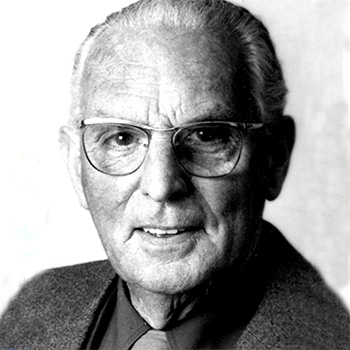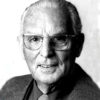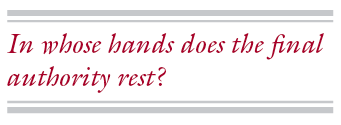Back to series


Spiritual Discipleship
Click here to open a Print - Friendly PDF
Ye call me Master and Lord: and you say well; for so I am. —John 13:13 KJV
Jesus Christ . . . is Lord of all. —Acts 10:36
| The question of authority is one of the burning issues of our times. It is challenged in every sphere—in family, church, school, and community. This revolt against constituted authority has been responsible for the disastrous breakdown in law enforcement, with a consequent upsurge in crime and violence.
Without some central authority, society will disintegrate into chaos and anarchy. Every ship must have a captain, every kingdom a king, and every home a head if they are to function aright. If this is true of society in general, it is no less true in the kingdom of Mansoul, as Bunyan termed it—in the lives of individual men and women. The crucial question to answer is, “In whose hands does the final authority rest?” For the Christian there are only two alternatives. The authority rests in the Master’s hands or in mine. Scripture leaves us in no doubt as to who should hold it—“[He] is Lord of all.” Lordship SalvationIn recent times in evangelical circles there has developed strident debate around what has been termed “lordship salvation,” a name that has been applied to the view that, for salvation, a person must believe in Christ as Savior and submit to His authority. Some, at the other end of the spectrum, go so far as to say that to invite an unsaved person to receive Jesus Christ as Savior and Lord is a perversion of the gospel, and is adding to the scriptural teaching about salvation. “All that is required for salvation is believing the gospel message,” says Thomas L. Constable.
In my view, it is defective teaching to divorce the Saviorhood of Christ from His lordship. Salvation is not merely believing certain doctrinal facts; it is trusting in and embracing the divine Person who is Lord of the universe and who atoned for our sins. To suggest that a person can exercise saving faith in Christ while knowingly rejecting His right to lordship over his life, seems a monstrous suggestion. In salvation we are not accepting Christ in His separate offices. To deliberately say, “I will receive Him as Savior, but I will leave the matter of lordship until later, and then decide whether or not I will bow to His will,” seems an impossible position, and cannot be sustained by Scripture. Having said that, I would concede that many have genuinely believed in Christ who, through inadequate teaching, were never confronted with Christ’s claim to lordship, and therefore they have not knowingly rejected it. The proof of the reality of their regeneration would be that as soon as they learn of Christ’s claim, they submit to His mastery. Christ’s call was not merely to believe in Him but to be His disciple, and that involves more than “making a decision” or believing certain doctrinal facts. A disciple is one who learns of Christ with the purpose of obeying what he or she learns. Jesus did not commission His disciples to go and make believers of all nations, but disciples; the terms are not synonymous, although there can be no salvation without believing (Matt. 28:20). When Peter preached the first sermon to the Gentiles in the house of Cornelius, he said, “He is Lord of all.” But Peter had not always recognized and bowed to His lordship. When, prior to that visit he saw a vision of a sheet being let down from heaven, containing all kinds of animals, reptiles, and birds, he heard a voice say, “Get up, Peter. Kill and eat.”
Have we not sometimes done what Peter did? When the Holy Spirit has prompted us to pray, to witness, to give, to break with some sin, to respond to a call to missionary or other service, have we said, in effect, if not in words, “Surely not, Lord”? When speaking to a large crowd, Jesus concluded His message with these challenging words: “Why do you call me, ‘Lord, Lord,’ and do not what I say?” (Luke 6:46). Acknowledging Christ’s lordship is more than repeating the chorus “He is Lord, He is Lord.” Mahatma Mohandas Gandhi was a patriot and mystic. He sincerely admired Jesus as a man, but on one occasion he said, “I cannot accord to Christ a solitary throne, for I believe God has been incarnated again and again.” He was willing to concede to Him equality with Buddha, Muhammad, Confucius, Zoroaster, and the rest, but not a unique and solitary throne. Yet that is exactly what He demands and deserves. “O Lord, our God, other lords besides you have ruled over us,” said Isaiah (26:13). Note that he did not say “instead of you,” but “besides you.” Israel did not want to entirely reject Jehovah, but they invited other gods to share their allegiance. But God will tolerate no rivals, no divided loyalty. No normal wife would be willing to share her husband’s love with another woman, but that was what Israel had done. The “other lords” take various forms. With some it may be business, with others sports, or money, or some a vocation that takes the place that is due Christ. The danger is that these “other lords,” though legitimate in themselves, may take an inordinate place in our time and affection and may eventually oust the real Lord. Ideally the coronation of Christ as lord of the life should take place at conversion. When we present the gospel to a seeking soul, we should follow the example of the Lord and not conceal the cost of discipleship. Christ was scrupulously open and honest on this point. Unfortunately, that is not always done. It is noteworthy that immediately on his conversion Paul realized what his only possible attitude should be toward Jesus. As soon as he got the answer to his question, “Who are you, Lord?” and realized that Jesus was indeed the Son of God, he asked a second question, “What shall I do, Lord?” (Acts 22:10). That was a clear, unequivocal submission to His lordship. His subsequent life proved that he never withdrew that allegiance. It should be remembered that in New Testament times a confession of Christ as Lord meant an irreversible change in public life. It needs to be clearly stated and strongly emphasized in our day that the Lord Jesus Christ has absolute and final authority over the whole church and every member of it in all details of daily life. Seeing that our adversary the devil is always trying to seduce the disciple from following Christ, it is not surprising that some disciples do withdraw their allegiance. When Christ’s teaching runs counter to their worldly and carnal desires, they take the reins of life back into their own hands. But Christ will not reign over a divided kingdom. If there was a time when Christ was really crowned as king in your life, it is salutary to ask the question, “Is Christ still king of my life in daily practice?” Thank God that even if allegiance has been withdrawn, on confession of that sin we can renew that coronation, and He will graciously reassume the throne. What Is Involved in Christ’s Lordship?Let us examine what submitting to Christ’s lordship really means. Full Submission to His Authority“In your hearts set apart Christ as Lord” (1 Peter 3:15).
Nelson made no response to this gesture but said quietly, “Your sword first, sir.” Laying down the sword was a visible token of surrender. So, like Paul, we must lay down the sword of our rebellion and self-will. Henceforth His will becomes the law of our lives. Our consistent attitude will be: “Thy will be done [in me] as it is done in heaven.” Submission means the complete surrender of our rights. That sounds a frightening prospect, but the experience of missions has proved that it is the path of unimagined blessing. Make me a captive, Lord, Recognition of His Ownership“He is Lord of all” (Acts 10:36). The word Lord here carries the idea of an owner who has control of all his possessions. Unless we recognize that fact in practice, Christ’s reign over us is purely nominal. We are His by creation, and we are His by purchase. Now we are His by self-surrender. All that we have we hold as trustees, not as owners. But His gifts are to be enjoyed. God “richly provides us with everything for our enjoyment” (1 Tim. 6:17). The story of Sir John Ramsden of Huddersfield, England, provides an interesting sidelight on this aspect of truth. I have checked the accuracy of the story with an old man from Huddersfield, who, when a boy, used to run messages for a Quaker and was rewarded with an orange and a penny. When quite a young man Sir John saw that Huddersfield was destined from its location in Yorkshire to become a great industrial center. Property was certain to acquire a largely increased value in the near future. He therefore began quietly to purchase houses and lands, and in a few years he was possessor of the whole of the town, with the exception of a cottage and garden that belonged to a Quaker gentleman. All the overtures of the real estate men having proved futile, Sir John Ramsden himself called upon the Quaker to see what he could accomplish by personal influence. The usual courtesies having passed between the knight and the Quaker, Sir John Ramsden said, “I presume you know the object of my visit.”
The cottage was built for my own convenience and suits me well. The garden, too, is laid out to suit my tastes. Why should I sell them?” Sir John Ramsden said, “I am prepared to make you a very generous proposal. I will put a golden sovereign on every inch of ground covered by this cottage and garden, if you will sell.” Sir John felt sure a proposal of such nature would not be in vain. So he inquired, “Will you sell?” “No,” said the Quaker with a mischievous twinkle in his eye. “Not unless thou’lt put them on edge.” That was altogether out of the question and somewhat chagrined the knight rose to leave. As he was going the Quaker said, “Remember, Sir John, that Huddersfield belongs to thee and to me.” Although the Quaker owned a very small part of the town, he could walk over all the rest of Sir John’s town to reach the part that belonged to him. In every life in which Christ’s claims are recognized only in part, a similar situation arises. Satan can say to Him, “That disciple belongs to You and to me! He is a Christian worker, but I control part of his life.” Where Christ is not lord in practice, life becomes a battleground of conflicting interests. Unquestioning Obedience“Why do you call me ‘Lord, Lord,’ and do not do what I say?” (Luke 6:46). Obedience from the heart is the true and unmistakable evidence of the reality of Christ’s lordship in our lives. Disobedience vitiates all our professions of loyalty. Our performance speaks more loudly than our professions. The test is not what I say but what I do. Were it not for Calvary’s revelation of the heart of God, we might well fear God’s sovereignty and think His demands tyrannical. Calvary has set that fear to rest once for all. There was a man in Germany, a village organist, who one day was practicing on the church organ, playing a piece by that master of music Mendelssohn. He was not playing it very well, and a stranger stole into the church and sat in the dimness of a back pew. He noted the imperfections of the organist’s performance, and when the latter had ceased playing and was preparing to depart, the stranger made bold to go to him and say, “Sir, would you allow me to play for a little?” The man said gruffly, “Certainly not! I never allow anybody to touch the organ but myself.” “I should be so glad if you would allow me the privilege!” Again the man made a gruff refusal. The third time the appeal was allowed, but most ungraciously. The stranger sat down, pulled out the stops, and on that same instrument began to play. And, oh, what a difference! He played the same piece, but with wonderful change. It was as if the whole church was filled with heavenly music. The organist asked, “Who are you?” In modesty the stranger replied, “My name is Mendelssohn.” “What!” said the man, now covered with mortification. “Did I refuse you permission to play on my organ?” Let us not withhold any part of our lives from the mastery of Christ. It may be that you are thinking, I recognize Christ’s claim to lordship of my life, and I want to live under His lordship, but my will is so weak. It lets me down at the crucial moment. How can I maintain recognition of His lordship? How can I keep Him on the throne of my life? Paul anticipated this dilemma when he wrote, “No one can say [“keep on saying” gives the tense of the verb] ‘Jesus is Lord,’ except by the Holy Spirit” (1 Cor. 12:3; italics added). The Holy Spirit is sent to enable the disciple to keep Christ on the throne of the believer’s life, and He delights to do it. He will detach our hearts from the world and attach our affections to Christ. He will empower our weak wills and make them strong to do the will of God. Other lords have long held sway, |
|

J. Oswald Sanders
Author J. Oswald Sanders (1902 - 1992) attended the Bible Training Institute in Auckland and joined its staff in 1926. Sanders served as an instructor and administrator at the Bible College of New Zealand. He became general director of the China Inland Mission and led the reorganization of the CIM into the Overseas Missionary Fellowship. He was instrumental in beginning many new missions projects throughout East Asia. Upon his retirement Sanders wrote prolifically, with many of his over 40 books. One of Sander's most notable works was Heresies Ancient and Modern, later published as Cults and Isms (1962). COPYRIGHT: This publication is published by C.S. Lewis Institute; 8001 Braddock Road, Suite 301; Springfield, VA 22151. Portions of the publication may be reproduced for noncommercial, local church or ministry use without prior permission. Electronic copies of the PDF files may be duplicated and transmitted via e-mail for personal and church use. Articles may not be modified without prior written permission of the Institute. For questions, contact the Institute: 703.914.5602 or email us.
COPYRIGHT: This publication is published by C.S. Lewis Institute; 8001 Braddock Road, Suite 301; Springfield, VA 22151. Portions of the publication may be reproduced for noncommercial, local church or ministry use without prior permission. Electronic copies of the PDF files may be duplicated and transmitted via e-mail for personal and church use. Articles may not be modified without prior written permission of the Institute. For questions, contact the Institute: 703.914.5602 or email us.
-
Recent Podcasts
From Politics to Pampers
by Michelle Morgan Knott, Aimee Riegert on November 15, 2024A stay-at-home mom shares life and spiritual lessons...Read More
-
An Unexpected Change – David Westerhoff’s Story
by David Westerhoff on November 8, 2024
-
The Faith of Jonathan Edwards
by Aimee Riegert, Arthur W. Lindsley on November 1, 2024
-
Recent Publications
Will You Be Ready?
by Thomas A. Tarrants on October 23, 2024Tom Tarrants gives insights on how we can...Read More
-
Should Christians Be Involved with Politics?
by Kerry A. Knott on October 1, 2024
-
Isn ’t Atheism Based on Scientific Fact Whereas Christianity is Based on “Faith”?
by Cameron McAllister on September 1, 2024
0
All Booked
0.00
All Booked
0.00
All Booked
23169
ADVENT CALENDAR: The Amazing Prophecies Fulfilled by the Birth of Jesus Christ
https://www.cslewisinstitute.org/?event=advent-calendar-the-amazing-prophecies-fulfilled-by-the-birth-of-jesus-christ&event_date=2024-11-28®=1
https://www.paypal.com/cgi-bin/webscr
2024-11-28

Next coming event
Days
Hours
Minutes
Seconds
ADVENT CALENDAR: The Amazing Prophecies Fulfilled by the Birth of Jesus Christ
On November 28, 2024 at 6:00 amTags
Speakers

J. Oswald Sanders
Author
Team Members



 On either side are godly men whose love for the Lord is beyond question, and each view aims to preserve the purity of the gospel presentation in our day. There must, therefore, be mutual respect, but both positions cannot be right.
On either side are godly men whose love for the Lord is beyond question, and each view aims to preserve the purity of the gospel presentation in our day. There must, therefore, be mutual respect, but both positions cannot be right. “Surely not, Lord!” Peter replied. “I have never eaten anything impure or unclean” (Acts 10:13–14). He set his opinion against the Lord and received a well-deserved rebuke. If Christ were lord of his life, he could not have said, “Surely not,” to Him. If he said, “Surely not,” that was a negation of His lordship.
“Surely not, Lord!” Peter replied. “I have never eaten anything impure or unclean” (Acts 10:13–14). He set his opinion against the Lord and received a well-deserved rebuke. If Christ were lord of his life, he could not have said, “Surely not,” to Him. If he said, “Surely not,” that was a negation of His lordship. The verb is in the imperative, so it calls for a definite act of the will, by which we take our place at the feet of Christ in absolute surrender. Paul states that this was the objective of His death and resurrection: “For this very reason Christ died and returned to life, so that He might be the Lord, of both the dead and the living” (Rom. 14:9; italics added).
The verb is in the imperative, so it calls for a definite act of the will, by which we take our place at the feet of Christ in absolute surrender. Paul states that this was the objective of His death and resurrection: “For this very reason Christ died and returned to life, so that He might be the Lord, of both the dead and the living” (Rom. 14:9; italics added). “Yes,” said the Quaker, “I have heard that thou has bought the whole of Huddersfield with the exception of this cottage and garden, and I have been earnestly solicited by thy agents to sell this. But I do not want to sell.
“Yes,” said the Quaker, “I have heard that thou has bought the whole of Huddersfield with the exception of this cottage and garden, and I have been earnestly solicited by thy agents to sell this. But I do not want to sell.


